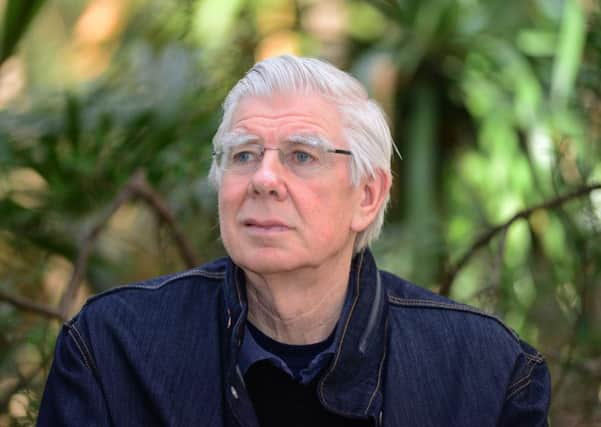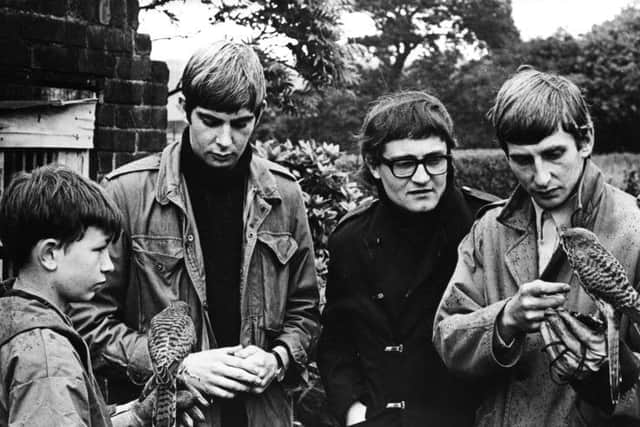Richard Hines: How the real Kes changed my life forever


For the opening ceremony of the London 2012 Olympic Games, Oscar-winning director Danny Boyle selected a small group of films as part of a continuing montage. These were quintessentially British productions, films which had made a significant cultural and historical impact on the country. One of them was Ken Loach’s Kes.
“It was an exciting but strange feeling to see David Bradley as Billy, raising his glove and calling ‘Come on Kes’ just as I’d called in the very same field 50 years ago,” says Richard Hines says, reflecting on the longevity of Kes, which was based on the book by his brother, the late Barry Hines, A Kestrel for a Knave.
Advertisement
Hide AdAdvertisement
Hide AdIn turn that book was based on Richard himself, who was a “hawk obsessed teenager” living in the South Yorkshire pit village of Hoyland Common, where he kept a kestrel named Kes in a Second World War air raid shelter in his brother’s garden.


As his expertise grew, Hines was appointed falconer on the film production and now almost a quarter of a century on, that same passion is the basis for his recently released memoir, No Way But Gentlenesse.
At once a love letter to kestrels, the book also explores the English class system. It’s something close to Hines’s heart - having failed his 11 plus exam, he missed out on going to grammar school, widely seen as the stepping stone to social mobility. It’s also beautifully written.
“Luckily I have an excellent memory, but I had such vivid experiences as a child living in a pit village surrounded by flower meadows, grazing cows, fields of golden wheat and skies full of singing sky larks,” he says. “Those memories are etched in my mind.”
Advertisement
Hide AdAdvertisement
Hide AdThere are also memories which aren’t so lyrical, not least the physical punishment doled out be his teachers. .


“I can’t forget my time at secondary modern school, the disappointment of being dumped in a school where I soon discovered my education didn’t matter, and then there were the beatings...”
Hines says the way he was treated at school impacted significantly on his relationship to training hawks.
“I was always drawn to the wildness of hawks and I am sure there in unconscious connection between them and my schooldays. If teachers treated me kindly, I was the perfect attentive student. But when they beat me I rebelled. Violence didn’t work on me, kindness did. It was the same for hawks. Through kindness an intractable hawk would allow you to spend time in its presence.”
Advertisement
Hide AdAdvertisement
Hide AdThroughout Hines’ memoir there’s a sense of championing the underdog, whether it be the loving attention he paid to his kestrels as a child or the racism he found himself appalled by when he volunteered overseas in Nigeria for a year (it was the hopeful promise of more hawks that led him there too).
“My dad was a miner. He spent eight hours a day on his knees shovelling 16 tons of coal each shift, but he was a very gentle, kind man. He couldn’t stand bullying or bad manners and had a very strong sense of honesty, fairness and justice. I loved my dad and I think I must have got my notion of fairness and justice from him.”
Hines details working on the set of Kes with startling accuracy and clarity, he recalls the weight measurements of the hawks he flew, the styles and flight paths that each of the three hawks that were used on set took and he reflects the difficulty in training the young David Bradley on how to handle and fly them.
“This is the hardest thing I’ve ever had to do,” Bradley said at the time, but the hard work paid off and Hines, his brother and Ken Loach found themselves sipping a pint of Barnsley Bitter celebrating a job well done. Barry, who went on to work with Loach again on The Price of Coal, was diagnosed with Alzheimer’s disease a few years ago and passed away in March, just a week after his brother Richard released his book.
Advertisement
Hide AdAdvertisement
Hide Ad“It was extremely sad of course, but I’m glad I wrote the memoir as it shows what an interesting, principled young man he was as he started his career, and records parts of his life that aren’t recorded anywhere else. To my delight Barry’s son and daughter love my book. They’ve enjoyed seeing their dad as a boy and young man, and meeting their grandad Hines, our dad, who had died long before they were born, for the first time in the pages of my memoir.”
After a negative encounter with a “posh falconer” Hines left hawking for several decades.
“I’d discovered I’d been obsessed with an upper-class sport and a world which at that time which wouldn’t have welcomed me. That realisation was one of the of the most important events in my life because shaped what I did and who I became.
“I developed a passion for the history of my own social class and its hardships and inequalities, and realised that history of disadvantage could still affect working-class kids. I then went on to work in schools in educationally disadvantaged areas and tried to help children improve their life chances.”
Advertisement
Hide AdAdvertisement
Hide AdHines also went on to make documentary films which gave a voice to working-class people. One was the first on television to put the striking miners’ point of view of the bitter industrial action of 1984/85 .
Later in life, Hines became a lecturer at Sheffield Hallam University, his own experience of Britain’s education system giving him a good idea of how not to teach.
“My time at secondary school led me to believe we all have latent talents. This informed the way I taught and of course from my own experiences I knew harsh treatment wasn’t the way to bring the best out in your students.”
Hines briefly reconnected with hawking in recent years, but things had changed and he decided it was no longer for him. However, his love, fascination and knowledge of the animals remains. In fact the sub-title to his book is ‘A memoir of how Kes, my kestrel, changed my life’ and it’s these animals that have hovered – quite literally - over much of his life. “It’s my love of hawks and nature which has shaped my view on life, the world, and our place in it. I try to arctulate this in a passage when I’m flying my merlin on the moor. Each time I pull on my falconry glove, like our hunter gatherer ancestors who painted handprints on the cave walls, I sensed I was reaching into the wild.
Advertisement
Hide AdAdvertisement
Hide Ad“Walking with my merlin on my glove on the moor I was made vividly aware that all of us, all species, share an evolutionary origin and live fragile transient lives, in which chance and the tiniest inherented advantage or the wrong decision can mean the difference between life and death. The most fundamental lesson my passion for hawks and nature has taught me is that we need to look after our world and respect all the creatures in it, and respect and help each other.”
No Way But Gentlenesse is published by Bloomsbury priced £16.99.